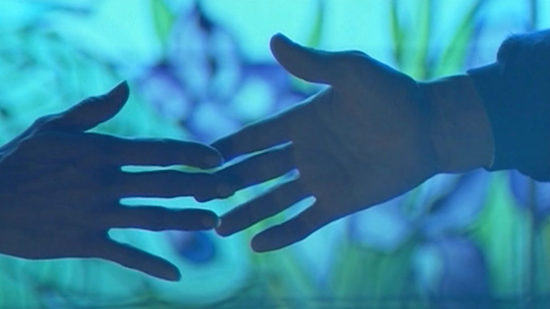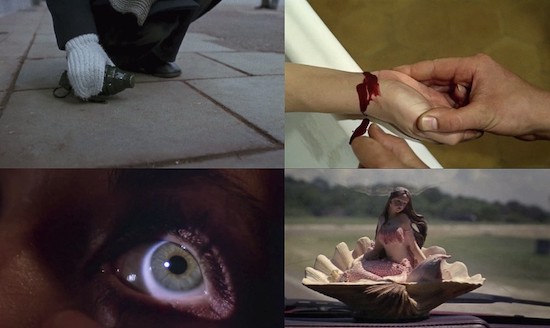As the pandemic nears a one-year mark, it can feel like we’re going around in circles. We survived 2020 only to wind up right back where we started. Of course, things have changed to an extent — the seismic impact of the U.S. election and the development of the vaccine are undeniable — but whatever joy one can muster these days is always tempered, and flags in the face of the next brutal headline or the overwhelming exhaustion that rattles in the background like an old radiator. A striking number of films from last year serendipitously spoke directly to the catastrophe of our moment, from the on-the-nose Groundhog Day predicament of Palm Springs to the simmering fury of Steve Queen’s Small Axe, and the gallows-humour of Dick Johnson is Dead. It’s a relief, then, to see 2021 continuing this trend of prophetic filmmaking with the timely release of Just Don’t Think I’ll Scream; a film whose very title, a play on Frank Vogel’s 1965 East German drama Just Don’t Think I’ll Cry, so neatly evokes the fractured emotional psyche of our zeitgeist.
Prescience aside, Just Don’t Think I’ll Scream stands as a breathtaking piece of experimental cinema; a towering collage erected from over 400 different films, which director Frank Beauvais binged in the throes of a depressive stupor from April to October of 2016. The results are startling, as Beauvais and editor Thomas Marchand arrange these clips into a piercing meditation on grief, alienation, and loss. The films range from international classics to rare oddities, East German obscurities to pre-code Hollywood, Japanese “pink films” to the 2016 Blair Witch Project remake. Yet even viewers well-versed with such sweeping cinematic scope might struggle to discern every individual title. The clips are often nondescript shots that have been stripped of sound; fragments of extreme closeups of fingers, hands, and mouths, or momentary establishing shots of doorways, church bells, birds in flight. These moments, once the building blocks of larger works, are rendered obsequious by Beauvais’ narration.

Beauvais’ voice looms on the soundtrack, presiding over the parade of silent clips. Despite a flurry of visual reference points, his overarching story reigns supreme: a jolting break-up left him living alone in a small village in Alsace near his mother. Feeling helpless with no car, job, or prospects, he spent hours in isolation watching four to five films a day. This binge, etched out in depression, anxiety, and anger, recalibrates the images on screen to its wavelength. To watch Just Don’t Think I’ll Scream is to sit alongside the filmmaker and relive this four-month journey in a condensed, volatile form. Occasionally, Beauvais digresses to shocking memories of his father’s death, trips to Paris visiting friends, and intermittently chronicles the turmoil of current events. While he was spared from suffering this low point at the height of a global pandemic, the political realities of 2016 are far from quaint. The narrative starts just months after the November 2015 Paris terror attacks, which capped off an already nightmarish year for France that began with the earthshaking Charlie Hebdo shooting in January.
With the societal unease of 2016, his heartbreak front and center, and lacking the means to return to Paris, Beauvais escapes into cinephilia. “I literally sink into other’s films,” he narrates with steady cool and calm, “lose all desire to write, film, do anything other than watch others’ films…and other’s films are no more than mirrors, not windows.” There’s a painful familiarity lurking that parallels the reality of the pandemic, and the striking metaphor of seeing only mirrors when looking for escapism just hits harder these days. We’re almost a year into the pandemic, and the novelty of staying at home and binge-watching has started to curdle — the gleeful days of Tiger King are over. There’s a grim irony to the way the pandemic numbs us to joy, while the virus itself numbs taste and smell. Our binges stretched over months spent in the same rooms, isolated from friends and family, have started to flatten media consumption into a gray sludge. In a bleak twist of fate, the pandemic has literalized the conditions of this broiling memoir to make it more relatable than Beauvais could have ever imagined.
Meanwhile, a synthesis of form and function charges Just Don’t Think I’ll Scream with riveting power. Contrast it with one of the more notable collage films of this century: Christian Marclay’s The Clock. Marclay and co compiled thousands of film clips showing clocks, time-pieces, or references to the time, to form a 24-hour supercut representing a day spent in “film-land”. Beyond the marvel of existing as a functional clock synced to the actual time of day wherever it screens, Marclay’s piece captures the natural rhythms as they exist on the cinematic landscape. One scene after another, people sleep, commute, have breakfast, lunch, and dinner, forming a unified tether across the cinematic spectrum. Yet Just Don’t Think I’ll Scream strips the clips of context and silences their soundtrack, allowing Beauvais to reconstruct these parts into a rhythm all his own. 20 minutes in, individual clips start to disappear beneath a somber story. It’s easy to place the shots in craggy black and white as fragments of a distant filmic past, but the contemporary films are sneakier, and at times we forget the montage altogether and believe we are watching Beauvais himself. There he is, lying in bed, there is his couch, the village where he lives, the forest where he walks, the television he watches — this simulacrum is so devastatingly effective. Of course, we never left Plato’s cave at all, just shadows on the walls, we’re still trapped in the bounds of the 400-film collage.

With this magic trick, Beauvais showcases how easy it is to project yourself into films, imposing your anxieties, fears, and frustrations along the way. Yet, in doing this, he also inverts the process: what at the start had seemed like a cacophony of clips morphs into a unified front. Through this act of curation, Beauvais forges a new language to express his state of mind so directly, that anyone (especially the anxious and exhausted denizens of the current unsettled moment) could easily understand. There are no prerequisites to this – no film degree required, merely a bit of patience to sink into its rhythms and let it guide you. Perhaps most surprising is how given the grim emotional underpinnings, Just Don’t Think I’ll Scream finds hope in its climax. Unlike The Clock, which loops when its runtime is up, this world comes with an expiration date, and a shockingly optimistic conclusion. Beauvais leaves us with a sense of forward momentum, moving past the tragedies of the here and now. In doing so, he shows it’s okay to hunker down, to cry, or even scream until you make it through. We all grieve differently.
Just Don’t Think I’ll Scream is available to rent on Film Forum’s virtual cinema platform now



